‘In the Heart of the Narragansett People’: BioBlitz Held on Tribal Land for First Time
June 12, 2023
AUKE UT NAHIGANSECK/CHARLESTOWN, R.I. — Every year the Rhode Island Natural History Survey chooses a location where it unleashes a gaggle of expert and amateur naturalists for a 24-hour species search called a “BioBlitz.”
The Survey chooses a different location for the event — although it has been held at Roger Williams Park twice — and has covered almost every corner of the state, including hosting an event once on Block Island.
While the Survey has staged the event in places of importance to Indigenous people and sites on which they lived before the violence and displacement of colonization, a BioBlitz had never been held on tribal land until last week.
For the 24th Annual Rhode Island BioBlitz, held from 2 p.m. Friday to 2 p.m. Saturday, the Narragansett Indian Tribe hosted the event on its reservation in “auke ut Nahiganseck,” which translates to “we dwell here.” The English name for the area is Charlestown.
While uncovering species was the task of the event, the tribe and its history were on display for the full 24 hours of biodiversity bonanza.
Dinalyn Spears, the tribe’s community planner and natural resource director, organized the blitz with Survey staff after she was approached about it last year.
Spears had often heard of the events, but usually couldn’t attend because of conflicts with the Tribal Powwow schedule. After talking about it with Survey director David Gregg and program manager Kira Stillwell, Spears felt as though this year would be a perfect opportunity.
Spears said she hoped the Survey would give the Narragansett Indian Tribe’s Natural Resource Department a “baseline inventory” of the species on the reservation so she and her team could start implementing any needed management or protection procedures.
From a symbolic perspective, Spears said she also loved getting to see a lot of “people of like minds” gathering together to appreciate the beauty of the land.
More than 350 people attended the blitz, setting a record for participation that Spears hoped was in part due to the historic location that isn’t always open to the public.
The event started with an opening ceremony that included a traditional prayer and words from Tribal Council members.
“We give thanks to the beauty of creation and biodiversity that surrounds us today,” Spears’s mother, Janice, said in an opening prayer honoring Mother Earth and nature.
First Councilman Cassius Spears Jr. spoke about the importance of the reservation to the Narragansett Indian Tribe and about the tribe’s connection to the natural world.
“I must first acknowledge that without a place there are no people,” he said to the crowd, “so this place is very sacred to us.”
He spoke about how the Narragansetts’ land once reached far beyond the 2,000 acres or so where the reservation sits, and where they host their ceremonies today.
“This little piece that we have today, this place that we steward today is even more important because of what we once had,” he added, telling the participants that they were “in the heart of the Narragansett people.”
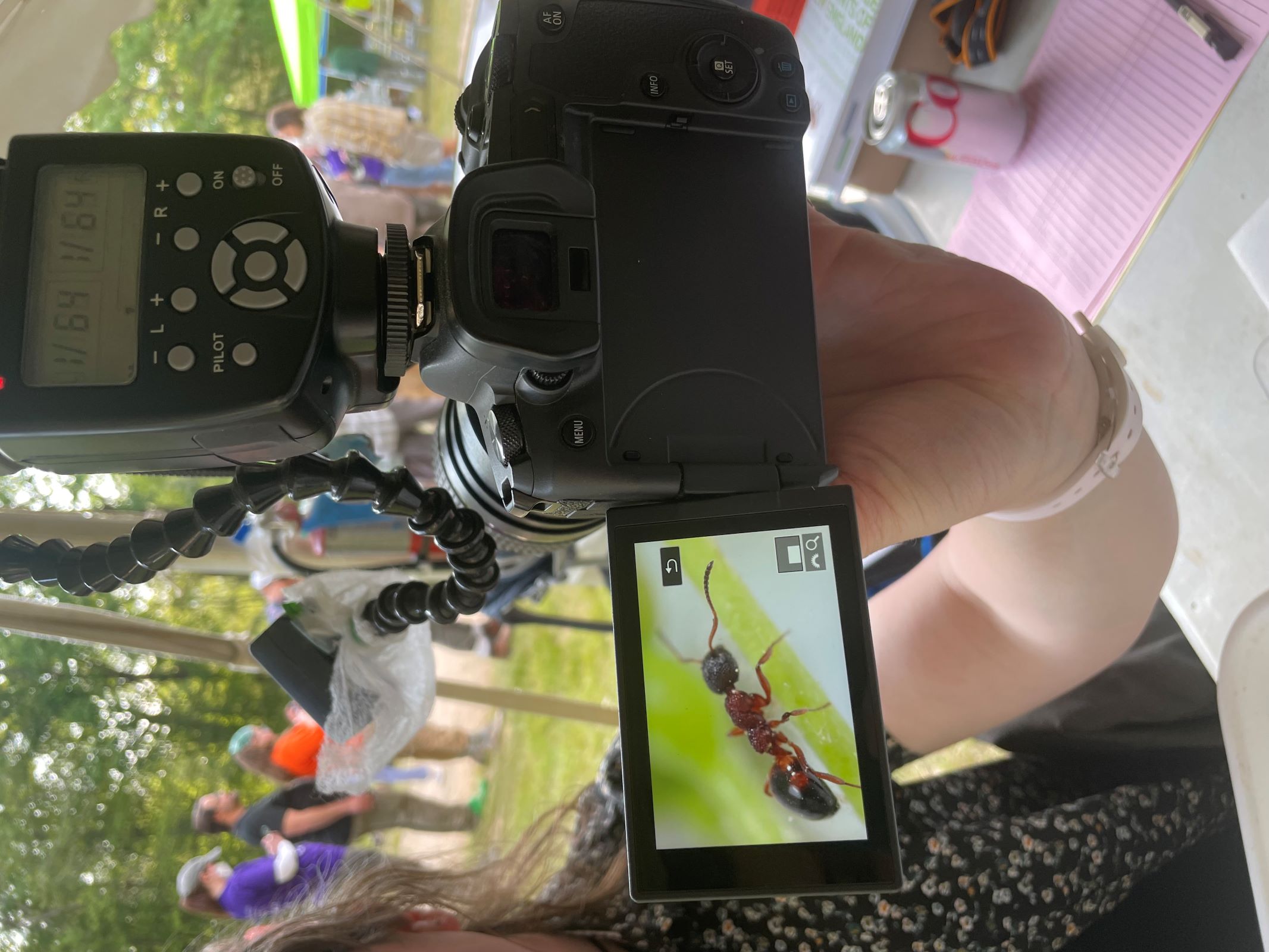
Cassius Spears said in some ways BioBlitz and the process of identifying the natural world aligns with the Narragansett story of creation and the process their people undertook to introduce themselves to the natural beings they encountered and consider family.
“When you’re out there, and you’re walking, in many ways … you’re greeting them, you’re forming that relationship,” he said.
The T-shirts for the event, designed by artist and tribal member Angel Beth Smith, also nodded to the Narragansetts’ creation story and how Turtle Island (North America) came to be.
With the end of the opening statements, Gregg blew his air horn and the blitz began.
Participants were allowed to travel through about 1,200 acres of mostly wooded reservation land. Some areas of cultural importance were marked off-limits, including the tribe’s Medicine Circle, which can only be entered from the east, according to Dinalyn Spears.
Spears and her natural resources team were in charge of many of the logistical challenges of the 24-hour blitz, and she thought that marking off the Medicine Circle area rather than trying to make sure none of the 300 visitors entered incorrectly was the better choice.
Participants were asked to avoid those areas and to avoid taking home specimens for identification. Temporary removal of any samples had to be approved by the tribe.
Notable finds included a northern black widow spider, which thrive during dry weather patterns like the one Rhode Island has seen recently, and a freshwater sponge collected from Schoolhouse Pond.
After several hours of early searching, many of the participants sat down for a dinner, also organized by Dinalyn Spears. The meal, which included succotash (a traditional Narragansett dish), was eaten around a fire pit while tribal member Thawn Harris told traditional Narragansett stories woven through with the modern history of his people — with many jokes mixed in.
When most people’s plates were clean at the end of dinner, Harris led a group of about 100 people in a Standing Quiver Dance, which he explained was typically performed by the men of the tribe on their return from a successful hunt.
The group of naturalists, led by Harris, snaked their way to a mound, contained by stone and built by his grandfather and uncles decades ago. When they reached the top of the man-made hill, Harris’ call-and-repeat got faster, and the sky started to thunder and then it rained down on the dancers.
When it was over, many participants walked away smiling and laughing to grab dessert or continue their identifications.
On Saturday, after a night of exploring and camping on the reservation, Danilyn Spears organized another event for participants, a medicinal plant walk, and an environmental awareness event for members of the Tribe.
The medicinal walk drew a crowd of about 25 interested naturalists of all ages, who learned things like the difference between false and true Solomon’s seal and hazelnut’s overall health benefits. Dinalyn Spears, a master gardener, answered questions and offered ideas for teas.
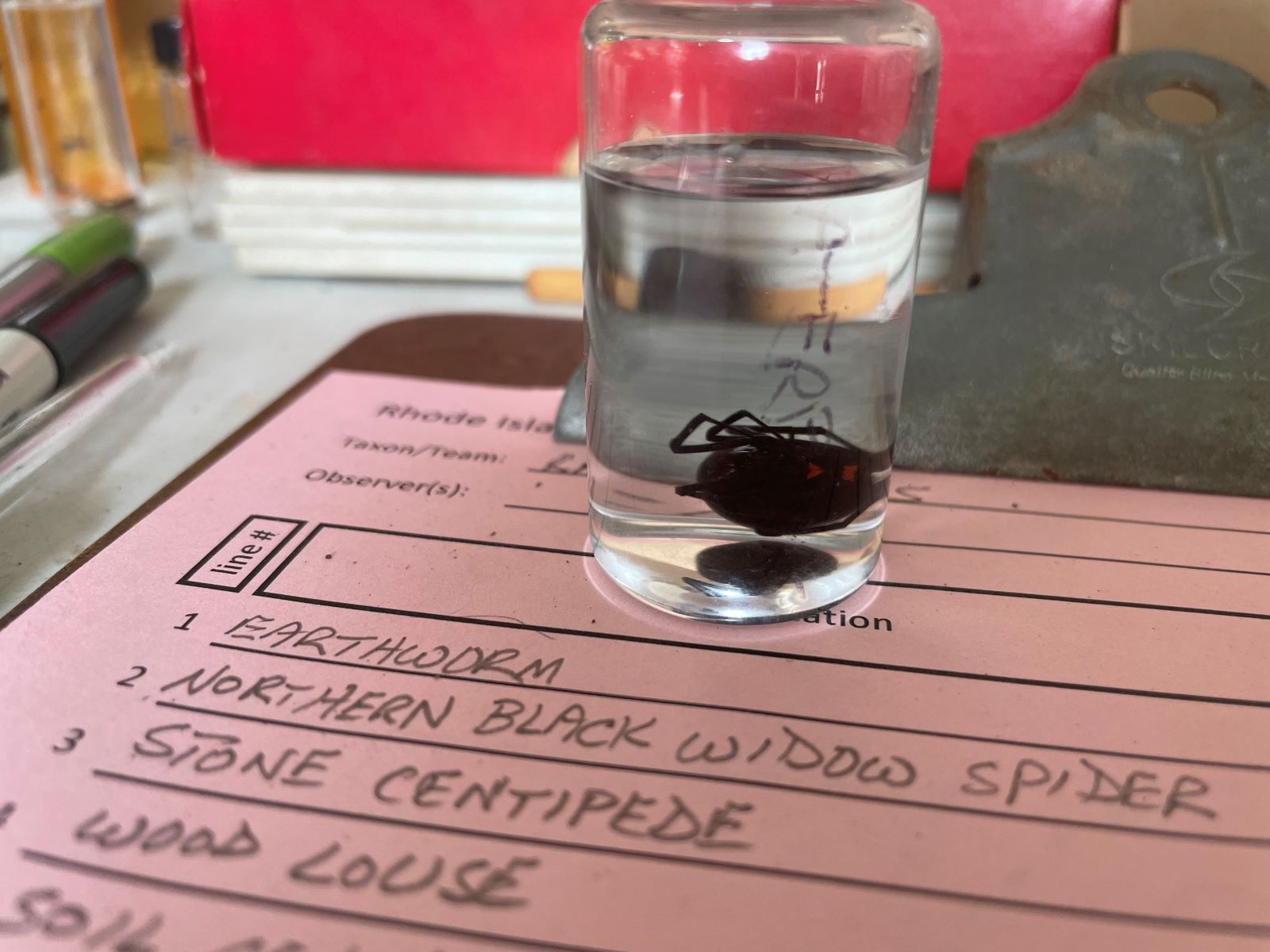
The environmental awareness event for Narragansett members offered the chance to learn about the programs Dinalyn Spears runs from Environmental Protection Agency grants for clean water and climate change mitigation.
The blitz ended with another horn blow from Gregg.
His preliminary count was 1,038 species. “Above average and not a record,” he said, explaining that a final count will be tallied at a later date. “But we know that this was an awesome BioBlitz.”
Through the course of the 24 hours, many participants told ecoRI News they felt privileged and lucky to spend time on tribal lands. Gregg echoed the sentiment, saying everyone told him “it was the best location ever.”
Gregg said he hopes the count will be a resource for the tribe as it is finalized and that the BioBlitz will be the start of an ongoing relationship between the Survey and the Narragansett Indian Tribe.
Before wrapping up the event, Dinalyn Spears thanked the Survey and offered gifts to Gregg and Stillwell.
Spears told ecoRI News she hopes there will be more events like the BioBlitz on the reservation in the future.
“For me it’s all about building new relationships … even rekindling old ones,” she said. For those who want to collaborate, she told them to reach out.
“This was great, at first I was worried,” Spears joked during her thank-you, closing speech. “Now I can go to sleep.”
The location for next year’s BioBlitz has not been announced yet.

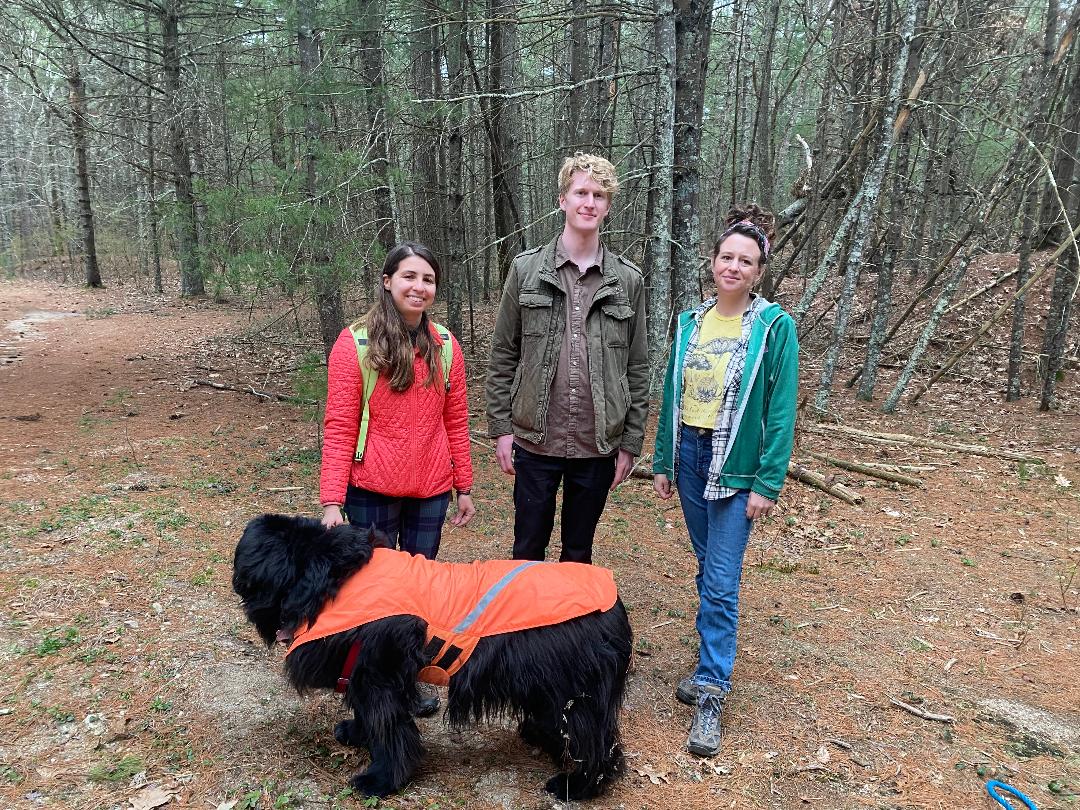
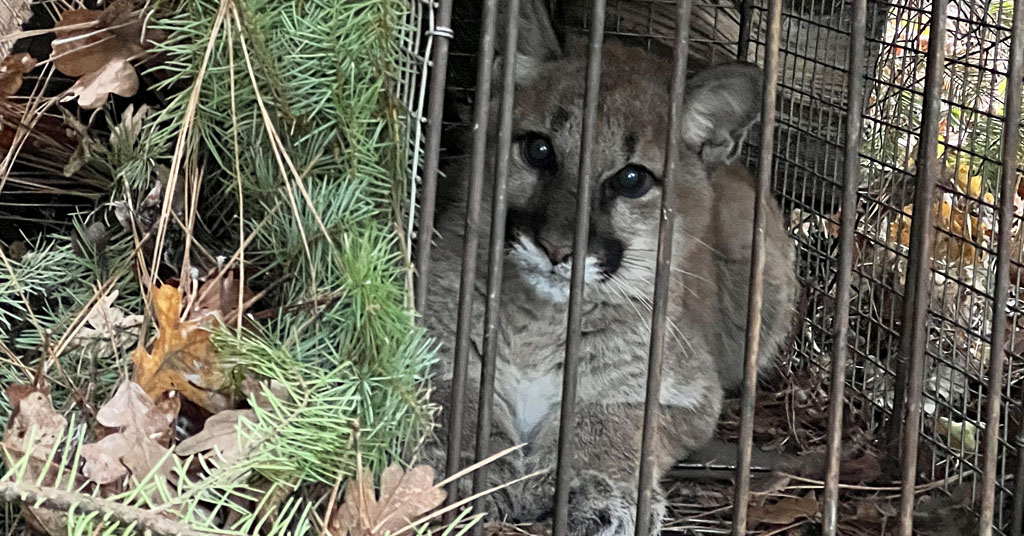
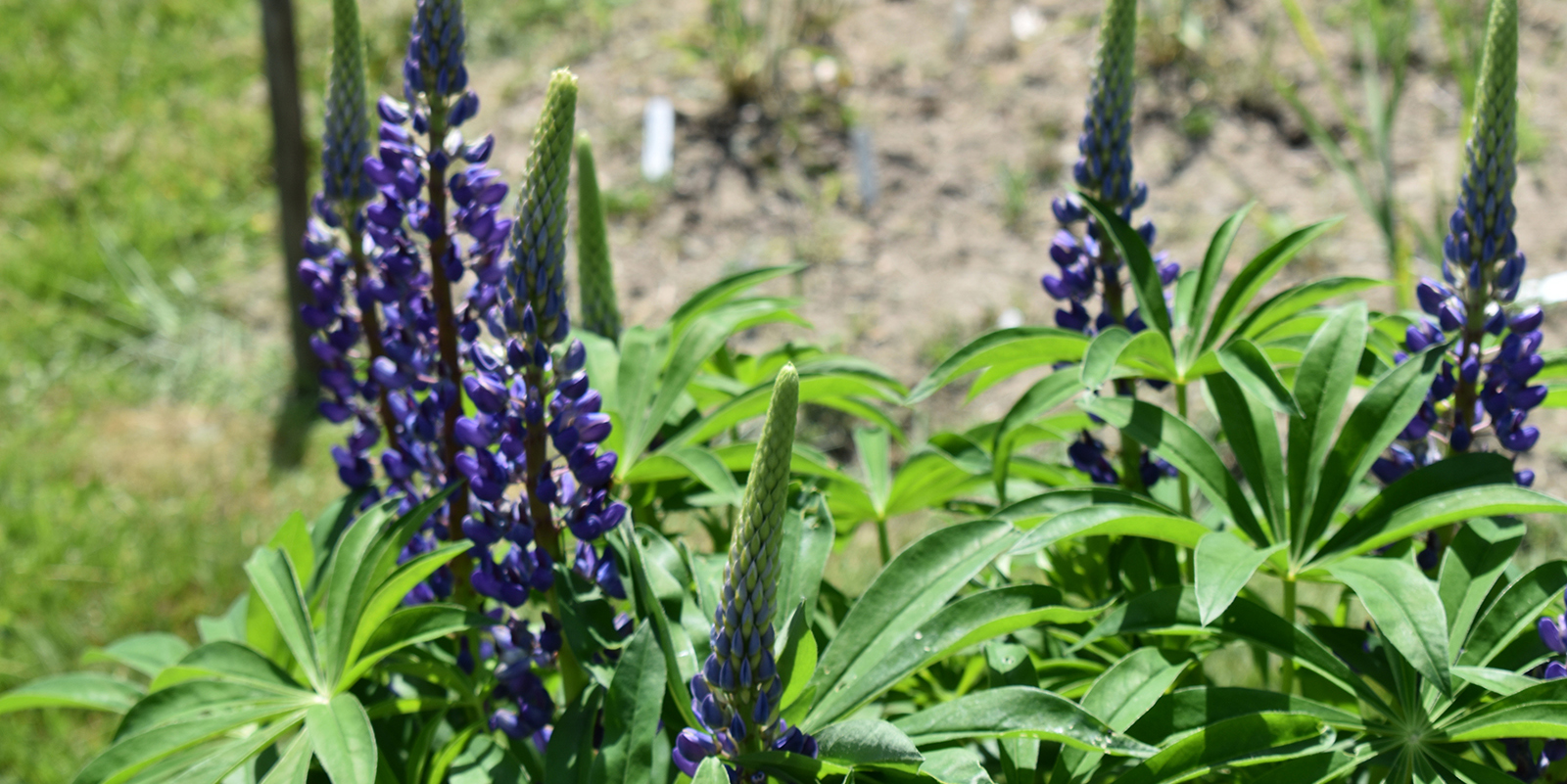
Wonderful event – annually so, but this year felt privileged atop that. Grateful to have participated alongside such knowledgeable and generous naturalists.
What an event, great article!
They have enough to study without being on the tiny bit of land we have left.